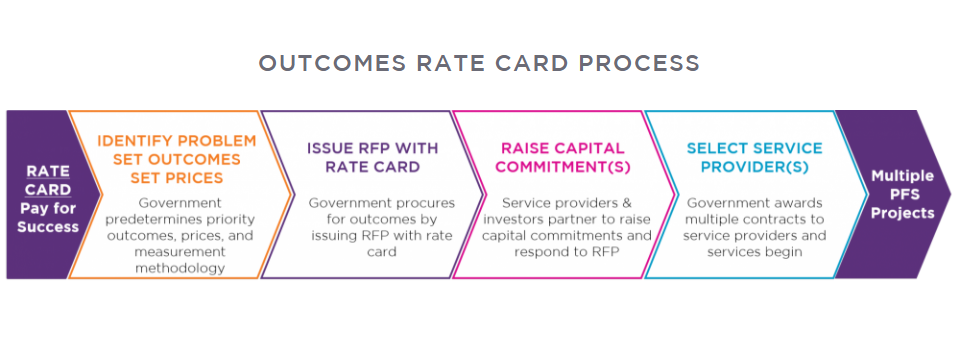
Thanks to the persistence of social entrepreneurs across the country, every day we see strategies that are working and delivering results in a rapidly changing world. This Evidence in Action blog series highlights the voices of the more than 70 social innovation organizations that make up the America Forward Coalition, the results-driven solutions our community has for our country’s most pressing social problems, and the evidence-based federal programs that are critical to scaling the impact of this work. Today we will hear from Social Finance about its newest outcomes-based financing tool, outcomes rate cards.
Governments across the United States face a recurring dilemma: how to solve intractable social problems despite increasing fiscal constraints. At Social Finance, we believe these social problems can be addressed by driving public resources toward programs that achieve meaningful results. We use Pay for Success as a tool to improve our communities, by aligning partners around the achievement of outcomes, rather than outputs.
Since 2011, Pay for Success in the United States has grown and evolved; projects have launched in 12 states, and dozens more are in development. Pay for Success projects are transforming the way government works across health, employment, criminal justice, education, and more—channeling funds toward outcomes-driven programs.
Since the earliest days of Pay for Success, Social Finance worked to expand access to high-quality services across diverse geographies and issue areas. Now, as part of our efforts to grow the reach of Pay for Success, we are adding an additional outcomes-based financing tool to the Pay for Success Toolbox: outcomes rate cards.
Outcomes rate cards standardize the Pay for Success approach by establishing a menu of outcomes a government seeks to “purchase” for a given issue and target population and the amount it is willing to pay each time a given outcome is achieved. With one outcomes rate card, governments can launch multiple projects, selecting multiple service providers to deliver on the same rate card.
We are pleased to announce that over the coming year we will work with the Riverside County Executive Office and Yale Child Study Center alongside the Connecticut Office of Early Childhood to develop the nation’s first outcomes rate cards. These partners were selected through the Social Finance Outcomes Rate Development Competition, supported through funding awarded last year from the Corporation for National and Community Service’s Social Innovation Fund.
Riverside County Executive Office will develop an outcomes rate card to improve services for Children of Incarcerated Parents (CIP), who face a range of circumstances that put them at a higher risk for adverse health outcomes, low academic performance, and diminished economic opportunity. An outcomes rate card will help Riverside County expand the range of services needed to adequately support CIP, driving resources toward high-quality service providers and helping set children up for long-term success.
Yale Child Study Center and the Connecticut Office of Early Childhood will build on their history of collaboration and experience with Pay for Success to design an outcomes rate card addressing early childhood outcomes. The partners will analyze data from the state’s Early Childhood Information System and identify the issues of greatest need facing the state’s young children and their families. Together, they will develop an outcomes rate card to support outcomes-based projects addressing that need.
Outcomes rate cards embody the best of Pay for Success standards—supporting high-quality services, ensuring effective programs have access to capital to scale, measuring results, and paying for what works—while increasing the number of people served by outcomes-based projects.
While outcomes rate cards were first used as an extension of PFS in 2011 in the UK, the concept draws on the 100% performance-based contracts implemented in New York City in the 1990s. The use of outcomes rate cards in the UK has led to faster PFS development timelines and has facilitated widespread use of outcomes-based contracts. Three outcomes rate cards developed and released by the national government have deployed roughly £60 million, contracted with 21 different service providers, and served over 25,000 individuals across the country in just five years.
In practice, developing PFS projects through an outcomes rate card allows the outcome payor (typically government) to set outcomes, terms, prices, measurement methodology and timelines before publishing the outcomes rate card. After publishing, the payor issues an RFP, and select one or more service provider partners to deliver services to achieve outcomes. As a result, the PFS process becomes more standardized, development timelines are cut, and governments can contract with multiple providers at once. In the UK, each rate card procurement process has led to the launch of four to seven distinct PFS outcomes-based contracts with high-quality nonprofit service providers—advancing the efficiency and scale of the traditional PFS development process.
This is innovation at work, and it is made possible by the Social Innovation Fund (SIF), a program of the Corporation for National and Community Service (CNCS). SIF is supporting the development of outcomes rate card through its second round of 2016 Pay for Success grants. Over the course of its tenure, SIF has focused on funding innovative approaches to scale evidence-based programs. Its support has brought and continues to bring, evidence into action on behalf of our nation’s most vulnerable citizens.
We know that the change that Pay for Success pursues– a shift toward evidence-based policy and funding – is larger than any one project or nonprofit. Outcomes rate cards are one tool to further these efforts, expanding the diverse, high-performing interventions taking on our toughest social challenges.
This post is part of America Forward’s Evidence in Action blog series. Follow along on Twitter with #EvidenceinAction and catch up on the series here.
Leave a Reply
You must be logged in to post a comment.